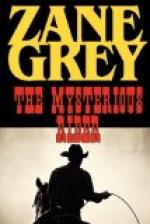“No!” thundered the rancher, purple in the face.
With bowed head and dragging step Wade left the room.
* * * * *
By slow degrees of plodding steps, and periods of abstracted lagging, the hunter made his way back to Moore’s cabin. At his entrance the cowboy leaped up with a startled cry.
“Oh, Wade!... Is Collie dead?” he cried.
Such was the extent of calamity he imagined from the somber face of Wade.
“No. Collie’s well.”
“Then, man, what on earth’s happened?”
“Nothin’ yet.... But somethin’ is goin’ on in my mind.... Moore, I’d like you to let me alone.”
At sunset Wade was pacing the aspen grove on the hill. There was sunlight and shade under the trees, a rosy gold on the sage slopes, a purple-and-violet veil between the black ranges and the sinking sun.
Twilight fell. The stars came out white and clear. Night cloaked the valley with dark shadows and the hills with its obscurity. The blue vault overhead deepened and darkened. The hunter patrolled his beat, and hours were moments to him. He heard the low hum of the insects, the murmur of running water, the rustle of the wind. A coyote cut the keen air with high-keyed, staccato cry. The owls hooted, with dismal and weird plaint, one to the other. Then a wolf mourned. But these sounds only accentuated the loneliness and wildness of the silent night.
Wade listened to them, to the silence. He felt the wildness and loneliness of the place, the breathing of nature; he peered aloft at the velvet blue of the mysterious sky with its deceiving stars. All that had been of help to him through days of trial was now as if it had never been. When he lifted his eyes to the great, dark peak, so bold and clear-cut against the sky, it was not to receive strength again. Nature in its cruelty mocked him. His struggle had to do with the most perfect of nature’s works—man.
Wade was now in passionate strife with the encroaching mood that was a mocker of his idealism. Many times during the strange, long martyrdom of his penance had he faced this crisis, only to go down to defeat before elemental instincts. His soul was steeped in gloom, but his intelligence had not yet succumbed to passion. The beauty of Columbine’s character and the nobility of Moore’s were not illusions to Wade. They were true. These two were of the finest fiber of human nature. They loved. They represented youth and hope—a progress through the ages toward a better race. Wade believed in the good to be, in the future of men. Nevertheless, all that was fine and worthy in Columbine and Moore was to go unrewarded, unfulfilled, because of the selfish pride of an old man and the evil passion of the son. It was a conflict as old as life. Of what avail were Columbine’s high sense of duty, Moore’s fine manhood, the many victories they had won over the headlong and imperious desires of love? What




